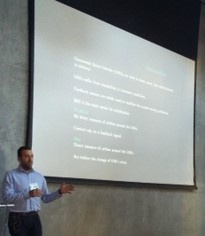Cohort 3 researcher Gergely Hantos describes the 4th Annual Workshop and Exhibition MEMS Testing & Reliability he recently attended in Santa Clara, California, in the heart of the Silicon Valley. The workshop was aimed at CEOs, CTOs, VPs and engineers working in the field of MEMS test and reliability.
MEMS are Micro-Electro-Mechanical Systems. They are similar to integrated circuits in the field of microelectronics, however MEMS have moving parts. Due to the difficult and complicated fabrication process, they are not standardised, every MEMS device is custom made. MEMS can be accelerometers, gyroscopes, microphones, pressure sensors, infrared sensors etc…MEMS can be found in most of our daily appliances. They are present in various fields from automotive industry (airbag sensors) to handheld devices (mobile phone gyroscopes). As MEMS play a critical role in some devices, their reliability is highly important. Just imagine an airbag with a faulty sensor or someone dialling 911 with a faulty microphone.
By attending the workshop I was hoping to get to know the state of the art test methods and current trends in MEMS testing especially in the field of MEMS microphones. There were two presentations focusing on microphones, which I found highly related to my project. I was able to get a better understanding of failure modes of MEMS microphones and the current test methods. There was also a presentation from Allyson Hartzell, Veryst Engineering, who works in the MEMS reliability industry nearly since its beginning. I have read one of her books and encountered a lot of her work during my literature review so it was real pleasure to hear from her in person. Alongside Allyson, Richard Chrusciel from FocusTest, was responsible for opening and closing the presentation session and both gave a very good general overview of the field of MEMS testing with current trends indicated.
The MEMS community is fairly small and very friendly; I came away with many new contacts including some of the presenters and with people from companies working with MEMS microphones (Bose, Bosch etc...).
Overall, I enjoyed my three day; it was my first time not only in California, but in the USA as well. I was also able to spend some time with my colleagues (Ruben and Christos) in San Francisco who were attending a conference. We even managed a bit of sightseeing!







